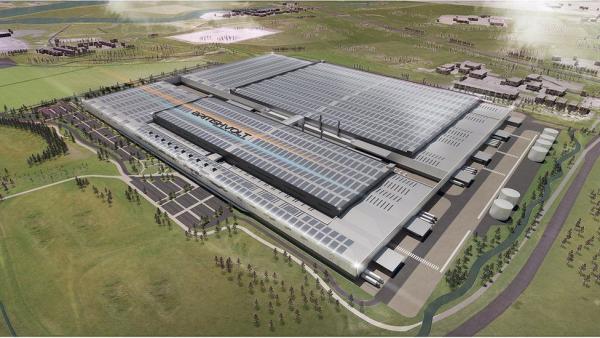Battery firm Britishvolt’s plans to build a lithium-ion gigafactory have received backing from the UK government through a principal support offer of funding.
The offer of funding— thought to be in the region of £100 million ($135 million)— was made through the UK government’s Automotive Transformation Fund (ATF), delivered by the Advanced Propulsion Centre.
The ATF is a funding programme to create a sustainable, zero emission automotive supply chain in the UK.
Britishvolt aims to build a £3.8 billion ($5 billion), 30GWh plant by the end of the decade.
The support enables Britishvolt’s long-term partners— the property fund management firm Trixtax and investment firm abrdn— to unlock £1.7 billion ($2.2 billion) of private sector backing to pay for the build of the project as well as to develop the associated supplier park.
A Britishvolt spokesman told BEST: “Government backing gave comfort to private sector that policy is firmly focused on EVs and low carbon battery production.
“It fired up capital markets and this is just the beginning. Interest from private markets is strong for ESG business such as ours.”
Britishvolt is due to make a series of follow up announcements including customer MoUs and R&D collaborations, relationships with blue chip UK automotive sports car brands and technology releases.
Julian Hetherington is the automotive transformation director, at the Advanced Propulsion Centre (APC), which manages the Automotive Transformation Fund on behalf of the UK Government.
He said: “This is a pivotal moment for the UK automotive sector as it demonstrates that the UK is a highly competitive landscape for investment in the full R&D and manufacturing ecosystem for these vital technologies.
“We have a vibrant and diverse industry, and Britishvolt’s significant investment in R&D and manufacturing will help establish competitive supply chains and satisfy this burgeoning demand – and in doing so will create thousands of highly-skilled, green jobs, regenerating a site that was previously home to the UK’s largest coal-fired power station.”
Unamimous building constent
Advanced works started last September following a unanimous planning decision approval earlier in 2021.
Last September, Britishvolt entered a cobalt supply agreement with Glencore in a bid to secure a raw material supply chain for its lithium-ion ambitions.
Britishvolt announced plans to build its plant in the North East of England in 2020 — after withdrawing from a memorandum of understanding with the Welsh government.
Growing UK battery industry
According to APC research, by 2030 the UK will need more than 90GWh per annum of battery capacity to meet demand from the vehicle and light commercial sectors— around 11% of the total demand across Europe.
Last year, a Faraday Institute report ‘UK electric vehicle and battery production potential to 2040’ estimated the UK’s EV battery manufacturing capacity could reach around 140GWh per year by 2040.
That will require the establishment of around seven battery production plants in the UK.
Last July, Envision Group joined the race to build the UK’s first lithium-ion gigafactory as part of a £1 billion ($1.3 billion) electric vehicle hub.
The company will invest £450 million ($622 million) to build the initial 9GWh gigafactory on the International Advanced Manufacturing Park (IAMP)— plans are in place to reach 25GWh capacity by 2030 with potential on site for up to 35GWh.
Coventry City Council is also in the race after entering into a joint venture partnership with Coventry Airport Ltd to bring forward proposals for a gigafactory on the site of Coventry Airport.
Coventry has been chosen as the preferred site across the West Midlands and has submitted a full planning application for a 5.7m sq ft gigafactory on the site.
The growing UK battery industry has already established an ecosystem that includes: WMG, University of Warwick, the Advanced Propulsion Centre, The Faraday Institute and UK Battery Industrialistion Centre.
The £3.8 billion Britishvolt scheme aims to deliver British made batteries for the automotive sector on a 93-hectare site of the former Blyth Power Station in Cambois, Northumberland.












